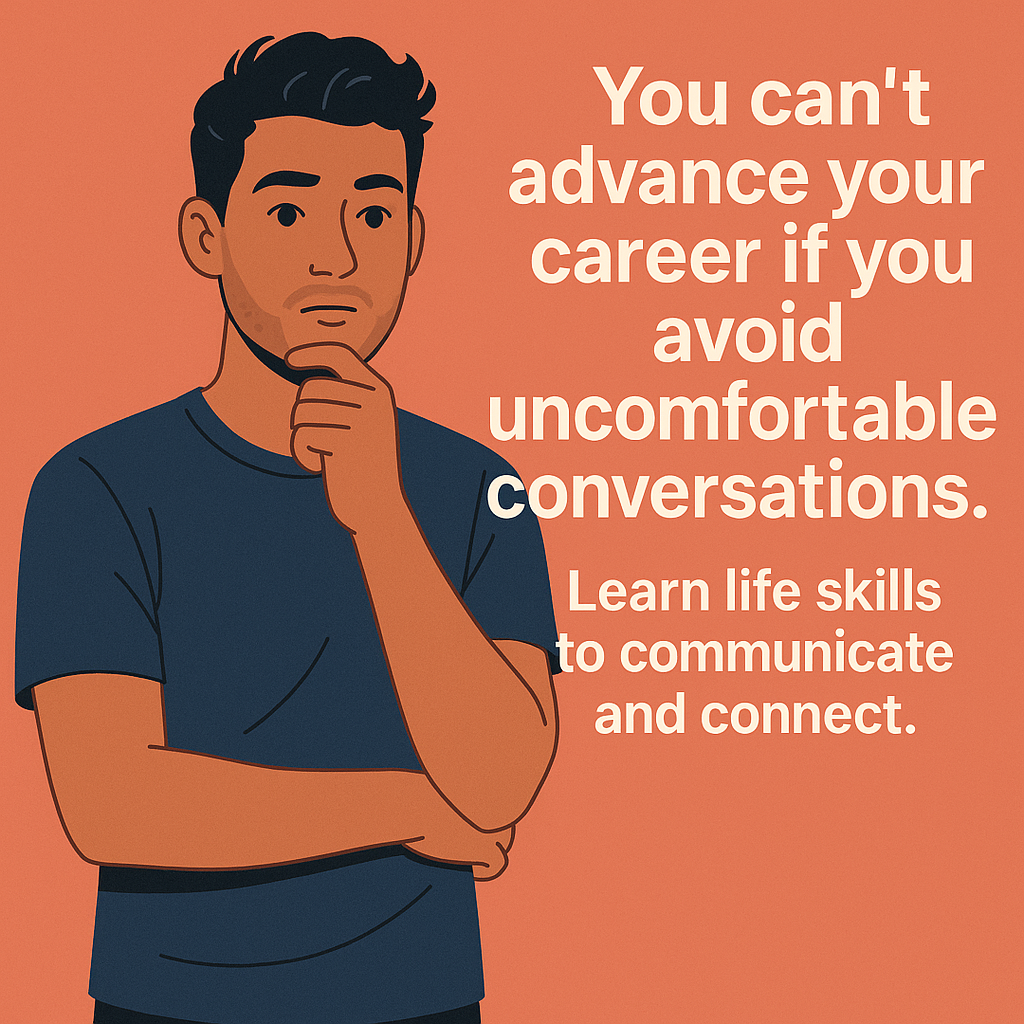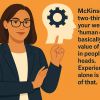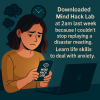
That Thing Where Gen-Z Can't Have Actual Conversations and It's Killing Our Careers
You can't advance your career if you avoid uncomfortable conversations. That's it. That's the whole fucking problem.
But here we are, an entire generation that would rather quit a job than tell Brad his Slack messages are passive-aggressive. We'd rather ghost an entire project than say "actually, this timeline is insane." We'll literally use ChatGPT to write an email asking for a raise instead of just... talking to our manager like a human person.
I watched my coworker spend 47 minutes crafting the perfect Slack message to ask if she could leave early on Friday. FORTY-SEVEN MINUTES. She could have just walked to our manager's desk and had a 30-second conversation. But no. That would require... words. Out loud. To another human.
We're All Digital Communication Ninjas Until Someone Wants to "Chat"
Remote work broke us. Or maybe we were already broken and remote work just made it obvious. Either way, we're fucked.
I'm 26 and I've been working remotely since I graduated. You know what I'm really good at? Crafting the perfect emoji response. Writing emails that sound professional but not too formal. Finding the exact GIF for every Slack situation. You know what I'm terrible at? Looking someone in the eye and saying "I disagree with your approach."
Last week my manager asked if we could "hop on a quick call" and I literally felt my soul leave my body. A CALL? With VOICES? What is this, 2003?
The worst part is I know this is holding me back. That promotion I want? Probably requires me to have actual conversations with actual humans about actual uncomfortable topics. But instead I'm over here hoping they'll promote me based on my excellent emoji usage.
The ChatGPT Crutch Is Real and It's Making Us Worse
Everyone's using AI to write their difficult emails now. "Hey ChatGPT, write a professional email asking for a deadline extension." "Help me respond to this passive-aggressive message from my coworker." "Write a script for asking for a raise."
And like... I get it. I've done it. We all have. But what happens when your boss wants to discuss that raise request in person? When Brad wants to "talk through" his feedback instead of sending it via email? When you have to fire someone and there's no ChatGPT prompt for looking them in the eye while you do it?
Downloaded Mind Hack Lab at 2am after completely freezing during my performance review. Not because the review was bad - it was actually good - but because my manager asked "where do you see yourself in 5 years" and I just... couldn't. Sat there making fish mouth movements while she waited. My friend Maya said their 30-minute session on communication anxiety helped her but honestly I was too panicked to pay attention to the techniques.
Life Skills Framework Nobody Taught Us (But Apparently We Need)
So there's this whole framework of 10 essential life skills that nobody told us about. Not in school, not in those mandatory HR trainings, definitely not on TikTok. And surprise, most of them involve actually interacting with other humans.
The Skills We're Missing:
Like Connection & Communication Skills - apparently that's a whole pillar of being a functional adult. Who knew? Not me, sitting here with my 47 draft emails about asking for feedback.
Or Confidence & Calm Under Pressure - you mean I can't just avoid all high-pressure situations forever? My strategy of "never volunteer for presentations" isn't sustainable? Shocking.
There's Emotional Mastery & Self-Forgiveness which sounds fake but apparently includes being able to process conflict without spiraling for 3 days afterward. Must be nice.
wait what was I talking about
Oh right, the life skills thing. So apparently emotional intelligence isn't just a buzzword companies throw around. It's like... actual skills you need. And most of us learned our communication skills from Discord and Twitter, which explains a lot.
The Money Cost of Being Emotionally Stunted
LinkedIn says 7 out of 10 top skills for 2025 are soft skills. SOFT SKILLS. You know, those things we can't do because we're too busy perfecting our email signatures.
People with high emotional intelligence make like $29,000 more per year or something. Twenty-nine thousand dollars! That's... that's a lot of money for being able to say "I think we should reconsider this approach" without having a panic attack.
But no, here I am, making less money because I can't tell Jennifer her project management style is chaos. Can't negotiate my salary because that requires an actual conversation. Can't lead a team because leadership involves... talking to people. In person. With eye contact.
Actually tried the Mind Hack Lab brief intervention for confidence under pressure last week. Or was it the week before? Time is meaningless. Anyway, there was something about shoulders and breathing but I was too stressed about my upcoming meeting to focus. The AI coach kept trying to get me to practice but practicing felt too much like the real thing which is the whole problem isn't it.
Remote Work Made Us Worse But Also We Were Already Bad
Look, I'm not saying remote work is evil. I love working from home. Love not commuting. Love being able to cry between meetings without anyone knowing.
But we got too comfortable with the buffer. Too used to having time to craft the perfect response. Too reliant on being able to mute ourselves while we scream.
Now when we have to have actual in-person conversations, we just... can't. Someone disagrees with us and instead of discussing it, we mentally draft our resignation letter. Someone gives us feedback and instead of asking clarifying questions, we nod and then spiral for six hours.
The professional development pillars or whatever are supposedly about building these skills but honestly when do we have time? Between crafting the perfect Slack message and using ChatGPT to write our emails, we're busy.
Every Avoided Conversation Is Money Left on the Table
- That promotion you didn't get because you couldn't advocate for yourself in the moment? Money gone.
- That project that failed because nobody would tell the PM their timeline was impossible? Money gone.
- That raise you didn't negotiate because negotiation requires talking? Money gone.
- That leadership role you didn't pursue because leaders have to have difficult conversations daily? Money gone.
We're literally paying thousands of dollars to avoid momentary discomfort. Make it make sense.
My therapist... wait no it was the AI coach from Mind Hack Lab... someone said something about cognitive biases. Like how we have this availability bias where we remember that one time a conversation went badly and assume all conversations will go badly. Or loss aversion where the fear of conflict feels worse than the actual conflict would be.
Day 6 of trying to consistently use the app and I still can't remember if the communication pillar comes before or after the confidence one. There's 10 pillars total which feels like too many but also I need help with all of them so maybe not enough?
The Sick Part Is We Know Better
We KNOW avoiding conversations is bad. We KNOW we need to develop these skills. We KNOW our careers are suffering.
But knowing and doing are different things. Knowing requires reading articles like this at 2am. Doing requires actually opening your mouth and saying words to another human being who might disagree with you.
The Stress Mastery & Work-Life Balance pillar is supposed to help with the whole "every conversation feels like a threat" thing. Because apparently our nervous systems can't tell the difference between "asking for clarification" and "being chased by a bear."
There's also Resilience & Life Transition Skills which might help with the fact that every small conflict makes me want to quit and move to the woods. But who has time to build resilience when I'm busy avoiding all sources of conflict?
I don't even remember what point I was trying to make anymore. Something about Gen-Z and conversations and money.
We're Not Lazy, We're Terrified
That's what nobody gets. We're not avoiding difficult conversations because we're entitled or lazy or whatever think pieces say about us. We're avoiding them because they're TERRIFYING and nobody taught us how to have them.
School taught us to write five-paragraph essays, not how to say "I need more resources to complete this project."
The internet taught us to communicate in memes and tweets, not how to navigate office politics.
Remote work taught us to hide behind screens, not how to read body language.
So here we are. An entire generation that would rather suffer in silence than have one uncomfortable conversation. It's not sustainable. We know it's not sustainable. But what's the alternative? Actually developing these skills? Learning to regulate our emotions? Building genuine connections with coworkers?
should probably do another Mind Hack Lab session for social anxiety but honestly I'm too tired. It's only 30 minutes but that feels like forever when you're already drained from pretending to be a functional human all day
The Framework Is Right There But We Won't Use It
All 10 life skill pillars directly address why we can't have these conversations:
- Confidence & Calm Under Pressure - for not panicking when asked a direct question
- Connection & Communication Skills - for actually connecting instead of just exchanging pleasantries
- Emotional Mastery - for processing feedback without wanting to die
- Focus & Self-Management - for staying present in difficult conversations instead of dissociating
But will we use them? Probably not. Too busy drafting the perfect email to avoid having the conversation in the first place.
maybe that's the real problem. Not that we don't have the skills, but that we won't even try to develop them. We'd rather stay in our comfort zone of digital communication where we can edit and delete and craft the perfect response.
who has time for professional growth when I'm spending 3 hours writing an email that should have been a 5-minute conversation
anyway I'm tired. This whole article is probably redundant. Other people have definitely written about this better. With statistics that make sense and conclusions that actually conclude something.
going to go stress-eat chips and draft seventeen versions of an email I'll never send. Maybe tomorrow I'll try that communication skills brief intervention again. Or maybe I'll just keep avoiding every difficult conversation until I'm 40 and still in the same role because I never learned to advocate for myself.
actually you know what? If you're reading this at 3am because you're stressed about a conversation you need to have tomorrow, just download the thing. Mind Hack Lab or whatever. At least the AI coach won't judge you for being a disaster at basic human interaction.
or don't. I'm not your mom. Keep using ChatGPT to write your emails and see how far that gets you. Probably about as far as it's gotten me, which is nowhere but at least I'm nowhere with really well-crafted auto-responses so
Ready to Stop Avoiding Those Conversations?
Build the communication skills that actually matter for your career. No more hiding behind perfectly crafted emails.
```








